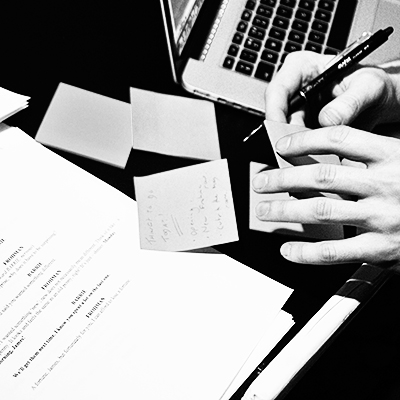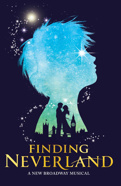Finding Neverland Scribe James Graham on Whiskey Rewards, Avoiding Writer's Block & Not Working By Candlelight

James Graham is one of the busiest writers in showbiz whose name you (probably) don’t know. At the moment he’s in rehearsal for both the new musical Finding Neverland, for which he wrote the book, as well his new work The Vote at the Donmar Warehouse in London. The latter piece not only stars such top talent as Judi Dench, Hadley Fraser and Catherine Tate, but it will also be broadcast live on election night. Graham also just opened his first film X and Y and has future projects aplenty in the works, including for Neverland producer Harvey Weinstein. Broadway.com caught up with Graham during a break in rehearsal at the Lunt-Fontanne Theatre to gain some insight into how the hard-working writer does it all.
What’s the first thing you do when you sit down to write?
I have to write early in the morning. I wish I didn’t. I wish I could be one of those romantic, cool writer guys who work into the early hours by candlelight and have a whiskey on the go and music. But for some reason, that just doesn’t work for me. I often write freehand; I’ll just explode some thoughts onto a notepad until I need to start. Then I open my computer, force myself not to turn on the Internet—at least for the first hour—and just begin. I think I write in the morning because I feel ahead. If I were to write at night, I’d feel behind and catching up. Writing in the morning makes me feel liberated.
What play(s) changed your life?

How do you stay motivated to finish a piece?
Deadlines help. I’ve got lots and lots of deadlines. I’ve got different shows and TV and dramas at the moment. I find that especially with theater—it’s never done for me. It’s not like a book—it’s a living, breathing, organic thing. I wake up every morning convinced that I can improve it and that motivates me.
How do you celebrate when you’ve finished a draft?
I am a massive whiskey fan—scotch whiskey in particular. So I do like a whiskey, depending on what time of day it is. The one down side of being so busy is that I don’t get much time to actually recognize that something is finished—print it off, look at it, be proud and go and celebrate. I normally have to leap straight on to the next thing, which is sometimes really tough.

What are your top tricks for fighting writer’s block?
My top tip for fighting writer’s block is often not to do what other people say: Don’t give yourself a break. Don’t take a walk. I actually find the process of putting your head down and allowing yourself to be bad takes the pressure off. Not every single word you write has to be gorgeous and a jewel and the most insightful thing ever. I was once really struggling with the first draft of a play, and the image I had in my head is that it was like a long daunting corridor of death and hell with all these mines and traps and scary things waiting to leap out. You’ve got to put your head down and run through it to the end. Then when you go back, you’ve got something to work with.
What’s your most childlike quality?
I feel like I’m generally quite childish. I relate to [Neverland subject] J.M. Barrie in that sense—he is like a boy in a grown-up’s body. The most childlike thing about me is that I have a really squealy laugh. When someone really makes me laugh, I sound like an eight-year-old girl. I squeal, and I can’t control it. I used to try and stop laughing, which is a depressing thing. I’m now at peace with my girly laugh.
What part of working on a musical surprised you the most?
I knew it’s collaborative, but I didn’t realize how collaborative. It’s not just working with composers and directors and choreographers—there’s a whole team of people I didn’t know had jobs in this industry. Normally when writing plays, it’s quite isolated, so to work with a team of 15 people every day is extraordinary. It makes you stay on your game.
What writer inspires you?

What’s the nitty, gritty hard work of being a writer no one ever told you?
The unromantic answer is how much of the business side there is. I’m constantly surprised by how hard I have to fight to have writing time. There are so many emails, so many phone calls, so many meetings that I have on a daily basis. It’s like you’re a self-employed entrepreneur and you’ve got to keep your business running. It’s something I’m not good at, and I’m sure a lot of writers are not good at that practical side of things.

What’s your advice to aspiring writers?
I think they should actually read play texts. Don’t just go watch plays or films. The texts are like architectural plans for a building. The more you see how the writers build a sentence structure, the more you get to see how the writers build their buildings. That’s how I learnt. You have to find your version of how you’re going to use those tools. You have to open up these manuals. That’s what they are: manuals on how to build plays.
What's your favorite line from Finding Neverland?

